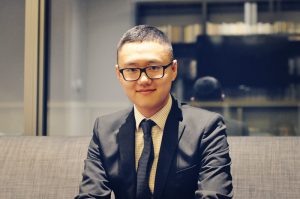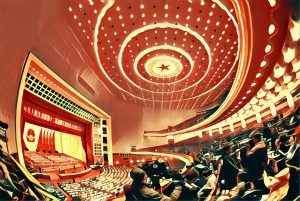
With Tony Huiquan Zhang
Assistant Professor of Sociology
St. Thomas More College
University of Saskatchewan
Venue: Multipurpose Room, Liu Institute for Global Issues
 Abstract: Recently, China’s princelings – political elites whose parents are also political elites – have formed an influential group in China’s top leadership. How have China’s princelings benefitted from their family backgrounds in their careers? This study seeks to answer the question and in so doing to add to the existing factionalist and meritocracy approaches to Chinese political elites. Based on biographical data of 293 princelings, quantitative analyses show that princelings have various advantages over non-princeling officials on the Central Committee. This is not simply familial advantage, however, as regression analysis finds parents’ rank and longevity do not significantly affect princelings’ career outcomes. Rather, the findings suggest that princelings benefit from membership in an affiliative status group, which differs from factions. The qualitative analysis find princelings’ status is formed and reproduced in a “collective” manner: (1) princelings’ status and early advantages originated in the state’s centralized resource allocation system; (2) princelings’ education and career choices are intertwined with the state’s practical and ideological goals; (3) princelings’ shared life courses strengthened their collective identity; (4) princelings’ career advantages are secured by the party-state’s cadre management system. These factors combine to reproduce princelings’ elite status within the party and state, what I term “collective elite reproduction”. Implications of princelings’ rule in China, to academic research, the public and the international relations (e.g. Canada-China relations) will be discussed.
Abstract: Recently, China’s princelings – political elites whose parents are also political elites – have formed an influential group in China’s top leadership. How have China’s princelings benefitted from their family backgrounds in their careers? This study seeks to answer the question and in so doing to add to the existing factionalist and meritocracy approaches to Chinese political elites. Based on biographical data of 293 princelings, quantitative analyses show that princelings have various advantages over non-princeling officials on the Central Committee. This is not simply familial advantage, however, as regression analysis finds parents’ rank and longevity do not significantly affect princelings’ career outcomes. Rather, the findings suggest that princelings benefit from membership in an affiliative status group, which differs from factions. The qualitative analysis find princelings’ status is formed and reproduced in a “collective” manner: (1) princelings’ status and early advantages originated in the state’s centralized resource allocation system; (2) princelings’ education and career choices are intertwined with the state’s practical and ideological goals; (3) princelings’ shared life courses strengthened their collective identity; (4) princelings’ career advantages are secured by the party-state’s cadre management system. These factors combine to reproduce princelings’ elite status within the party and state, what I term “collective elite reproduction”. Implications of princelings’ rule in China, to academic research, the public and the international relations (e.g. Canada-China relations) will be discussed.
About the speaker: Tony Huiquan Zhang is an assistant professor of sociology at the St. Thomas More College federated with the University of Saskatchewan. He studies political sociology in general, especially in the areas of public opinion, Chinese politics and social movements. Right now he is working on (1) transformations of people’s public opinion, value orientations and subjective well-being in China and the world; (2) political elite selection and reproduction in China; and (3) the diffusion mechanisms of social movements in China and the United States. His works have appeared in British Journal of Sociology, Sociological Forum, Chinese Sociological Review, Journal of East Asian Studies, and Weather Climate and Society. His research project, entitled “The Rise of Princelings: The State and Collective Elite Formation in China”, has received research grant from the Chiang Ching-kuo Foundation (2018-2019).
RSVP